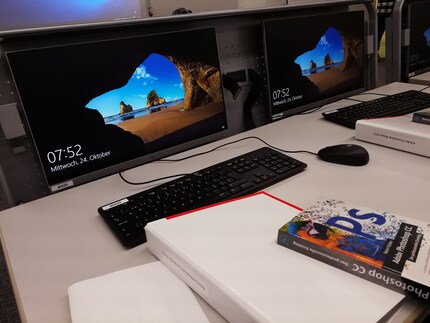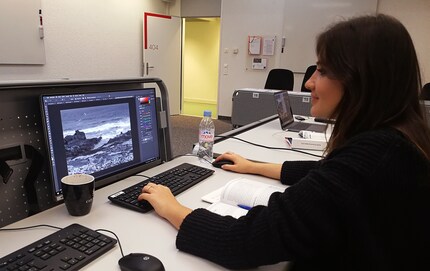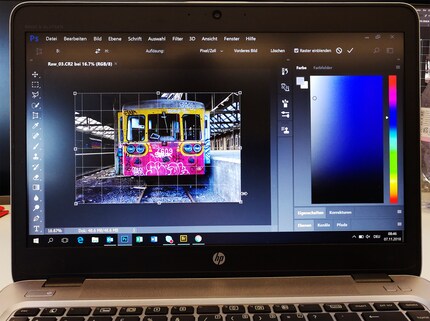

Is an Adobe Photoshop basics course worthwhile?
Would you like to feed your WhatsApp chats with funny photo montages and your Insta feed with unrealistically retouched images, but you don't have the necessary skills? We've taken a Photoshop basics course and know what you can expect.
Photoshop always scared the hell out of me. Scared because I didn't know how to use it and, despite YouTube tutorials and step-by-step instructions, I rarely got anywhere. I tended to fall off the branch. On my head. Face first. My editorial colleague Vanessa Kim had a similar experience. As some know-how in this area would be good for our job as editors at Galaxus, we decided to attend an "Adobe Photoshop Basics" course together at the Migros Club School.
The following points are covered over four half-days:
- How to handle and use Photoshop Bridge (we didn't even know it before🙃)
- Application and installation of graphic standards / settings
- Determine image sections, resolutions and image formats
- Optimising and retouching images
- Employees with layers
- Crop image content and create photomontages
- Insert text elements
- Providing images for further processing (print, for example)

Our first lesson in an intimate group of eight participants begins with a round of introductions. Our instructor, an experienced photographer, wants to know who we are and what we expect from the course. He seems a little shy at first, but quickly warms up. Our workstations are each equipped with a computer on which the programme is already pre-installed. However, we prefer to work on our laptops, which is no problem. There is also a folder with course materials, a USB stick with exercise files and a reference book on the table.
Important: The software is not included in the course price, but can be purchased at a reduced price as part of course participation.

Then we get started. We keep switching between the theory in the book and the theory in the folder. We deal with one or two case studies for each topic. The corresponding exercise files are on the stick. Solution files can also be found on the stick, so that we know roughly what the image could look like after processing. Unfortunately, we realise that the solution and exercise files are a little mixed up and have been stored in the wrong folders on the stick. This causes confusion at first, but it's not a big deal.
Our lecturer demonstrates each example at the front of the projector so that we can do the same on our computer. The pace is fast. But nobody is afraid to ask questions if something goes too quickly. Questions are always welcome and we are only too happy to ask them. We also approach him during the breaks between lessons and ask for help with specific examples from our work. It quickly becomes apparent that not all course participants are on the same level. Some are experienced photographers and have such advanced questions that Vanessa and I can only look at each other questioningly. But that hardly bothers us, as these excursions give us insights into completely new areas. And if it does get too technical, we benefit from these few minutes to take a breather.

What helps us massively: On each new course day, elements from the last one are looked at again and repeated. This allows routine to creep into the use of the individual Photoshop tools. In this way, we can overcome our fear of quickly forgetting what we have learnt. In addition, there will be enough time on the last day of the course to ask final questions and look again together at those tools and procedures that we have not yet internalised.

Skilly Vanilly
Now you're probably wondering what we've taken away from this course for our work and which image corrections we'll be using regularly from now on. Specifically, these are the following points:
- Smoothing out horizons
- Retouch away blemishes
- Eliminate red eyes
- Adjust contrast, brightness, saturation, tonal value and gradation
- Crop images correctly
- Crop and move objects
- Create photo montages
- Working with RAW files
- Integrate text elements

.
Conclusion
Despite our initial trepidation, we are glad we took the course because we took home far more than just a certificate: Apart from the points listed above, we have lost our fear of the digital image editing programme and have the confidence to experiment beyond what we learnt. We now understand how Photoshop is structured and how we can help ourselves when problems arise. And lo and behold, I haven't worked with "Paint" once since then 😜
Here are more courses from Migros Club School
As a massive Disney fan, I see the world through rose-tinted glasses. I worship series from the 90s and consider mermaids a religion. When I’m not dancing in glitter rain, I’m either hanging out at pyjama parties or sitting at my make-up table. P.S. I love you, bacon, garlic and onions.


